10 DIY Night Creams For Beautiful Skin
Let these simple recipes work their magic while you sleep to give you radiant skin!
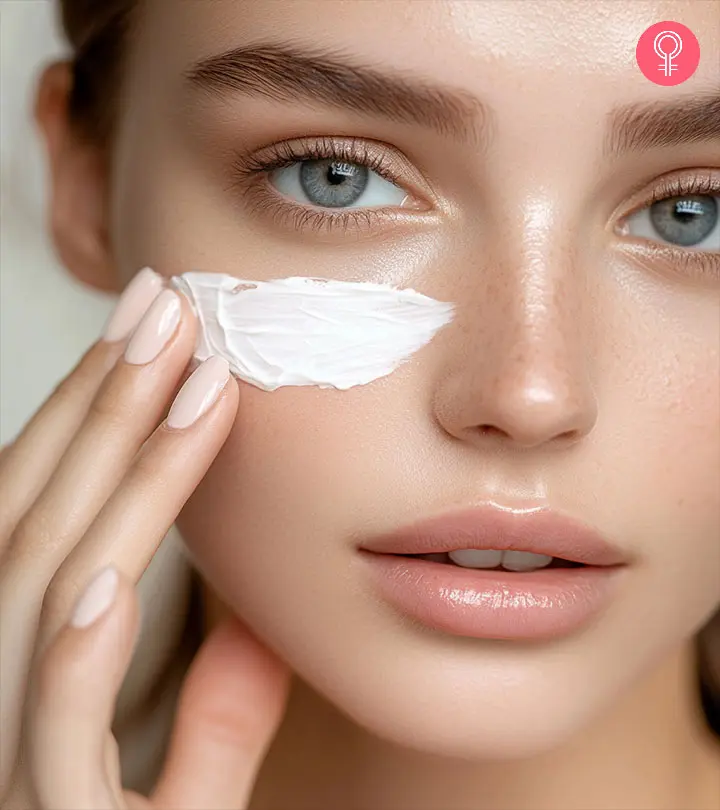
Image: Midjourney/ StyleCraze Design Team

It isn’t easy to locate a single night cream that provides your skin with complete nourishment. While some creams focus on skin whitening, others focus on reducing age signs, and some others brighten dark circles. That is why many women choose to make DIY night creams for beautiful skin. Surprisingly, the ingredients used to make night creams are not uncommon or unusual. Aloe vera, vitamin E, glycerine, squalene, and a few other typical ingredients are needed for the process.
You can use very simple and completely natural ingredients to make night creams at home. We’ve compiled a list of several DIY creams that you can easily make at home in this post. These may be preserved for a long time and are cost-effective and chemical-free. So, jump right in to find your favorite!
In This Article
10 DIY Night Creams For Beautiful Skin
Incorporating a DIY night cream into your self-care and beauty routine can act as a rejuvenating remedy for tired and dull skin, offering some insights into how to get glowing skin naturally.
1. Moisturizing Olive Oil Night Cream
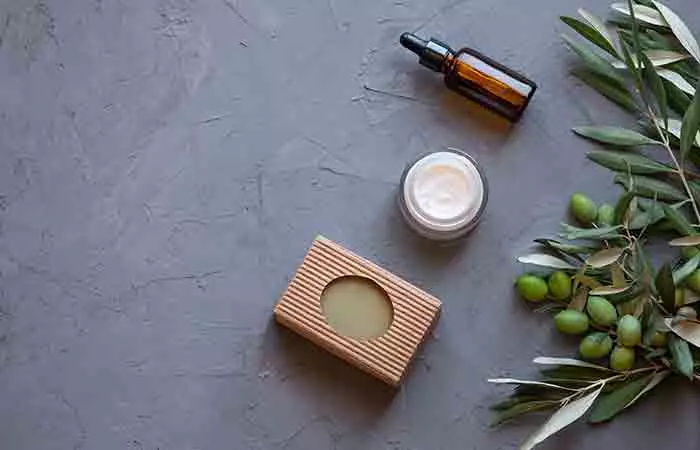
Olive oil is the main ingredient of this homemade cream. It helps to lock in the moisture of the skin (1). Another active ingredient is coconut oil, which hydrates and moisturizes the skin (2).
Note: This cream should be used with caution in individuals with acne-prone skin as coconut oil and olive oil are comedogenici An ingredient that blocks the pores, resulting in acne, blackheads and blemishes even though it may have high nourishing properties. .
You Will Need
- 1/2 cup extra virgin olive oil
- 2 tablespoons coconut oil
- 1 tablespoon beeswax
What You Have To Do
- Mix olive oil, coconut oil, and beeswax in a saucepan on low heat until the mixture melts.
- Allow the cream to cool down and store it in a container in the fridge. You can use this for 1 month.
Elise, a blogger, described her experience of using her DIY night cream made of coconut oil, olive oil, apricot kernel oil, aloe vera gel, rose water, and vitamin E to moisturize her skin. She said, “I’ve really been enjoying this for my face AND my Keratosis Pilaris on my arms. I DO however recommend using this as a night cream, as your body heat will melt it to an oil, and you’ll be a bit shiny for a hot minute (i).”
 Did You Know?
Did You Know?2. Glycerine Cream
Glycerine (or glycerol) hydrates the skin and improves skin barrier function
(3). Coconut oil can improve skin health with its antimicrobial and antioxidant properties (4). Rosewater and almond oil refresh and smoothen and rejuvenate the skin, respectively (5), (6).
Note: Almond oil and coconut oil can have a comedogenic effect, and so this recipe should be used with caution on acne-prone skin.
You Will Need
- 2 tablespoons rose water
- 1 tablespoon coconut oil
- 1 tablespoon almond oil
- 1 tablespoon glycerine
What You Have To Do
- Take a double boiler and add almond and coconut oil to it. Heat the mixture so that all the ingredients are blended.
- Remove the boiler from heat and add rose water and glycerine to the mixture.
- Allow the cream to cool down.
- Store it in a container and use it daily before going to bed.
3. Cocoa Butter Wrinkle Cream
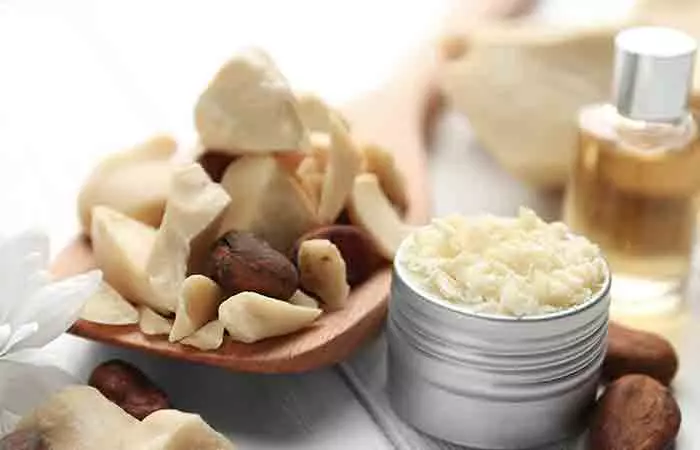
Cocoa butter is rich in phytochemicalsi Compounds found in plants with antioxidant properties that help reduce oxidative damage and decrease the risk of diseases. that moisturize and protect your skin, strengthen the skin barrier, and prevent premature aging (7).
You Will Need
- 2 tablespoons cocoa butter
- 1 tablespoon virgin olive oil
- 1 tablespoon coconut oil
What You Have To Do
- Add all the ingredients in a boiler and heat.
- Heat until the ingredients are mixed well.
- Turn off the heat and allow the mixture to cool down.
- Store the cream in a container. Apply this to your face and neck.
Note:
Avoid this remedy if you have oily skin.
 Quick Tip
Quick Tip4. Green Tea Detoxifying Cream
Green tea has antioxidant and anti-inflammatory properties that protect your skin from harmful UV rays and prevent photoagingi The condition in which prolonged sun exposure to UVA and UVB rays cause skin damage leading to premature aging and skin cancers.
(8). Aloe vera can hydrate the skin and has anti-aging effects (9).
Note: Aloe vera may cause allergic reactions in individuals with sensitive skin or allergy-prone skin and hence, should be used with caution.
You Will Need
- 1 teaspoon green tea extract
- 1 tablespoon almond oil
- 1 tablespoon rose water
- 1 teaspoon essential oil
- 1 tablespoon aloe vera juice
- 1 tablespoon beeswax
What You Have To Do
- Mix beeswax and almond oil in a double boiler and boil the mixture.
- Heat until it melts completely.
- Remove the mixture from the flame and add aloe vera and mix.
- Add green tea extract, essential oil, and rose water.
- Apply it on your skin and store it in a container.
5. Anti-Acne Aloe Vera Night Cream
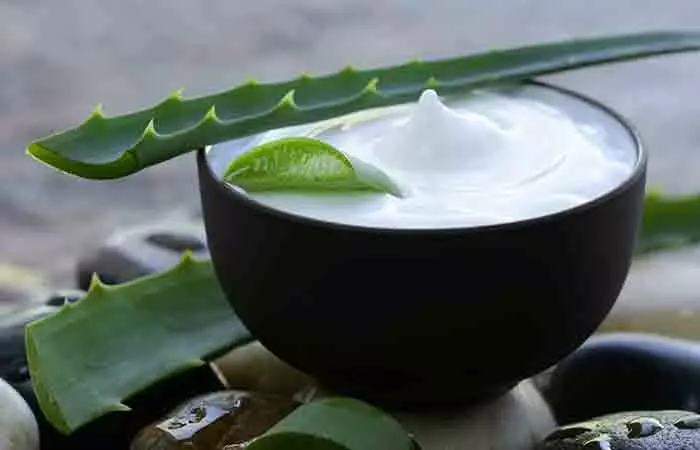
Aloe vera can help treat acne and blemishes. It also has anti-aging and moisturizing effects. The amino acids in aloe vera soften hardened skin cells and improve skin texture (9). Lavender oil improves collagen synthesis, while primrose oil improves skin hydration, elasticity, firmness, and smoothness (10), (11).
You Will Need
- 2 tablespoons aloe vera extract
- 1 teaspoon lavender oil
- 1 teaspoon primrose oil
What You Have To Do
- Extract fresh aloe vera gel from the plant and mix it with lavender oil.
- Add a teaspoon of primrose oil and blend.
- Apply it to your skin.
- Store the cream in a container and apply it daily.
6. Refreshing Milk Cream
Milk cream cleanses, moisturizes, and nourishes your skin. It contains lactic acid that reduces the appearance of fine lines and wrinkles and makes your skin firm and smooth (12). Rosewater tones your skin while olive oil and glycerine moisturize it.
You Will Need
- 1 tablespoon milk cream
- 1 teaspoon rose water
- 1 teaspoon of olive oil
- 1 teaspoon glycerine
What You Have To Do
- Mix all the ingredients and blend using a blender or whip with a spoon until you get a smooth, lump-free paste.
- Store the cream in a container and apply it to a freshly cleansed face and neck.
7. Revitalizing Apple Night Cream
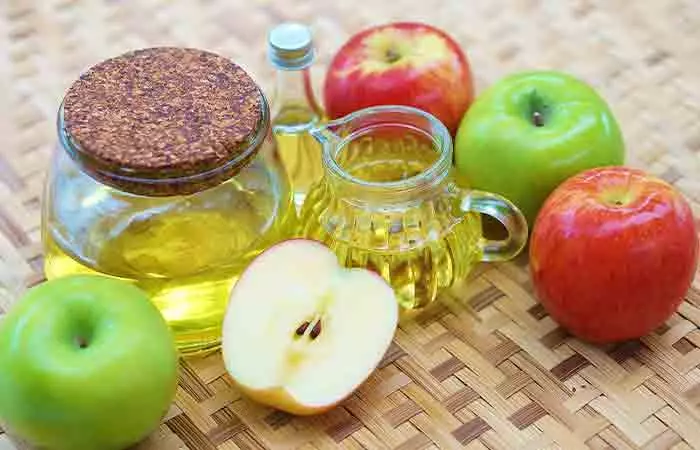
Apples contain antioxidants like quercetin, catechin, etc. (13). These antioxidants can protect the skin from oxidative damage, thus helping prevent photoaging and skin disorders.
You Will Need
- 2 apples
- 4-5 tablespoons rose water
- 1 teaspoon of olive oil
What You Have To Do
- Cut the apples into small pieces and blend them with olive oil in a blender.
- Blend the mixture until the paste becomes smooth.
- Pour the mixer in a boiler and heat on low flame.
- Remove the mixture from heat and add half a cup of rose water to it.
- Store it in a container once it cools down.
- You can use this cream for up to 6 days if refrigerated.
8. Skin Lightening Night Cream
Turmeric
is rich in bioactive compounds that can inhibit tyrosinase activityi Stepwise action where an enzyme accelerates the process to create melanin in the skin, hair, and eyes. (14). Studies have shown that facial masks containing yogurt can moisturize the skin and maintain its elasticity (15). Almonds contain fatty acids and antioxidants that can nourish your skin and offer anti-aging benefits (16). Sandalwood powder has anti-inflammatory, antiseptic, astringent, and emollient properties that help lighten scars and blemishes and smoothen the skin (17). Saffron helps lighten the skin tone (18).
You Will Need
- 7-8 almonds
- 1/2 cup yogurt
- 1 teaspoon turmeric powder
- 1 teaspoon sandalwood powder
- 4-5 drops lemon juice
- 3-4 saffron strands
What You Have To Do
- Soak almonds overnight. The next morning, peel them and grind them to make a smooth paste.
- Add yogurt, turmeric, lime juice, sandalwood powder, and saffron to this.
- Blend until it gets smooth.
- Store this cream in a container (it lasts for a week if refrigerated).
9. Avocado Anti-Aging Night Cream
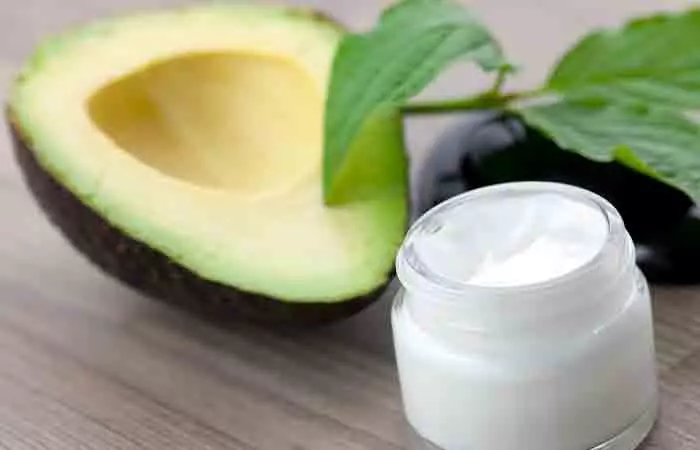
Avocado is rich in phytochemicals that can provide nourishment to dry and damaged skin (19). It also possesses wound-healing properties that can help relieve breakouts and blemishes.
You Will Need
- 1 avocado
- 1 egg/ 1/2 cup yogurt
What You Have To Do
- Mash avocado in a bowl to make a smooth paste.
- Add eggs (or yogurt) and the mashed avocado to a blender.
- Blend this into a smooth paste.
- Store it in a container and apply this night cream twice a week.
10. Almond Oil Night Cream For Dry Skin
Almond oil is rich in vitamin E. It can smoothen and rejuvenate skin and improve skin tone (6). Honey and cocoa butter impart smoothness and shine to the skin.
You Will Need
- 1 tablespoon almond oil
- 2 tablespoons cocoa butter
- 1 tablespoon honey
- 2 teaspoons rose water
What You Have To Do
- Melt almond oil and cocoa butter in a boiler.
- Take the mixture off the flame and add rose water and honey to it.
- Blend this mixture and allow it to cool.
- You can store it in a refrigerator.
Incorporating night creams into your skin care routine can help improve your overall skin texture and health. But can you use them during the day? Find out in the next section and learn how these creams fit into your beauty routine before bed.
Key Takeaways
- Homemade natural night creams are less costly and free of chemicals.
- Preserve these DIY creams in a cool and dry place, as they are not long-lasting..
- You can use aloe vera, honey, coconut oil, and avocado as the main ingredients of the cream, as they have excellent skin-rejuvenating properties.
- Apply night cream at bedtime after cleansing and toning.
Can You Use Night Creams During The Day?
No. Avoid using night creams during the day as they contain ingredients like retinoids that may leave your skin vulnerable and sensitive to the sun and increase the risk of sun damage. Plus, their thick consistency may leave your skin feeling heavy and greasy throughout the day.
You may instead use day creams that are formulated with SPF that shields the skin from the harmful UV rays. They also are lighter in texture and contain ingredients that offer hydration throughout the day. Choose products designed for daytime use to ensure your skin receives the appropriate protection and care.
Here are a few tips that will help you maintain beautiful skin and prevent premature aging.
Tips To Maintain Beautiful Skin
- Do not go to sleep with makeup on as it can clog the pores in your skin, leading to breakouts.
- Drink lots of water throughout the day as staying hydrated keeps the skin replenished and supple.
- Use a clean pillowcase to avoid impurities from clogging your skin pores.
- Do not pick at your skin if you have acne as this will increase the chances of it spreading.
- Exercising regularly keeps your skin refreshed and replenished, thus imparting a youthful look.
- Avoid eating junk food and follow a balanced diet to help nourish your skin and keep it healthy.
Infographic: Top 5 DIY Night Creams For Beautiful Skin
Finding a chemical-free night cream that provides your skin with all-round nourishment can be quite a task. The good news is that you can make one readily with some simple kitchen ingredients. Check out the infographic below for our top five DIY night creams for beautiful and radiant skin.
Some thing wrong with infographic shortcode. please verify shortcode syntaxYou need to pick a night cream for your skin with careful consideration, as night creams play a vital role in restoring the health of the skin. However, commercially available products are often heavily priced and usually loaded with chemicals that may do more harm than good in the long run. DIY night creams for beautiful and glowing skin circumvent both these issues easily as they can be made using readily available, staple ingredients that are all-natural. Another advantage of DIY night creams is that you can customize them to suit your skin care needs perfectly. Aloe vera, milk, rosewater, green tea, cocoa butter, almond oil, avocado, and olive oil are some of the most popular organic ingredients that you can choose from to make your night cream. With a few simple tricks and nourishing ingredients, you can create an effective night cream that is customized to your unique skin needs. Just remember to conduct a patch test by applying the cream you make on your hand, and wait for at least 24 hours before applying it to your face to prevent the risk of adverse reactions to any ingredients. Also be mindful about storage as these creams do not contain preservatives, and hence have short shelf-lives.
Frequently Asked Questions
How can I make my face glow naturally?
You can use natural ingredients like aloe vera, olive oil, coconut oil, green tea, and cocoa butter as moisturizers to make your face glow naturally.
Is night cream really necessary?
The skin repairs itself at night during sleep and a good night cream helps facilitate skin healing, reduce signs of aging, and provide deep conditioning, highlighting the benefits of night creams.
What is the difference between a night cream and night moisturizer?
Night creams, with their heavier texture, are great for combination and dry skin types. They are meant for nighttime usage and help repair and regenerate the skin while you sleep. In contrast, night moisturizers can be used at any time and are thickly textured to provide deep hydration and keep dryness away.
Should you use night cream every night?
Yes, using a night cream every night is ideal for your skincare routine. Night creams help to nourish and hydrate your skin while you sleep, leaving your skin refreshed and regenerated in the morning.
Which is the best night cream or night serum?
Night creams are heavier, work best for combination and dry skin, and are best at night to help repair and regenerate your skin while you sleep. However, night serums are lighter and quickly absorb into the skin, with active ingredients targeting specific skin concerns like dark spots, wrinkles, and fine lines. Therefore, choosing between a night cream and serum depends on your skin type and individual needs.
Can I use serum and night cream together?
Yes, using both serum and night cream can give you extra hydration and benefits. But it is essential to pick the right products for your skin and use them regularly as part of your skincare routine.
How do I make a DIY night cream for oily skin?
A simple DIY night cream for oily skin can be made by mixing 1 tablespoon of aloe vera gel and half a teaspoon of olive oil. Then, add the contents of one vitamin E capsule by poking a hole in it with a needle, squeezing out the oil, and mixing everything together. Finally, transfer the cream to a clean container and apply it to your face and neck at bedtime.
How do I make a DIY night cream for combination skin?
To nourish and rejuvenate your combination skin, add aloe vera gel to soothe and hydrate the skin. Then add jojoba oil as it is a lightweight oil and easily absorbed into the skin, and it helps balance oil production. Lastly, add vitamin E as it is an antioxidant that helps protect the skin from damage and premature aging.
How do I store my DIY night cream for maximum effectiveness?
Store homemade night creams in a clean, sealed container and keep it in a cool, dry spot, away from sunlight. This helps avoid heat, light, and air damage that can interfere with the ingredients and make the cream less effective.
Illustration: Best Homemade Night Creams For Beautiful Skin
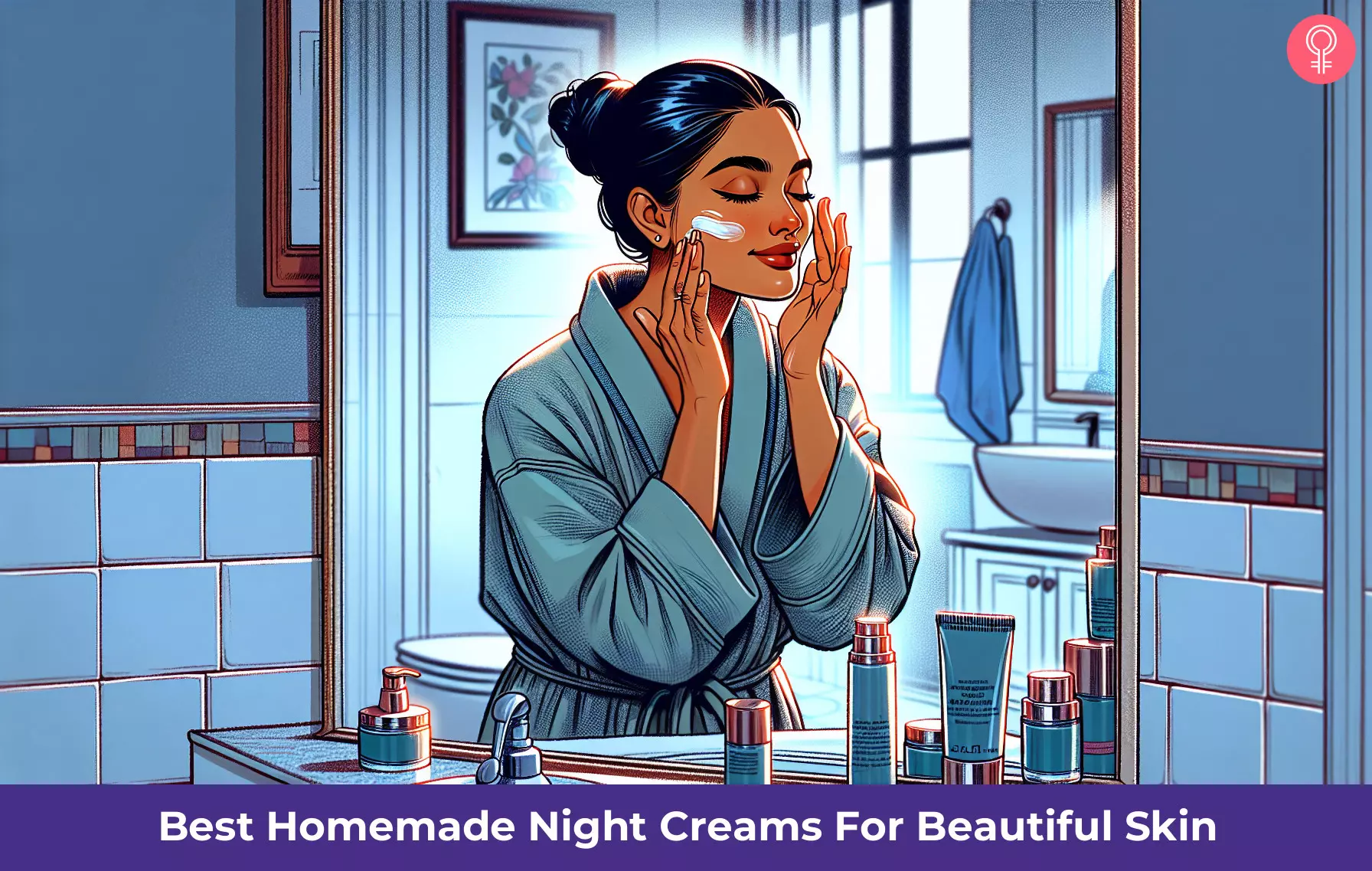
Image: Dall·E/StyleCraze Design Team
Get rid of pigmentation and dark spots with this easy DIY night cream recipe. Watch this video tutorial to learn how to make your own night cream at home!
Personal Experience: Source
StyleCraze's articles are interwoven with authentic personal narratives that provide depth and resonance to our content. Below are the sources of the personal accounts referenced in this article.
i. DIY Moisturizing night creamhttps://thesuitablynamed.blogspot.com/2016/01/diy-moisturizing-night-cream.html
References
Articles on StyleCraze are backed by verified information from peer-reviewed and academic research papers, reputed organizations, research institutions, and medical associations to ensure accuracy and relevance. Read our editorial policy to learn more.
- Effect of Olive Oil on the Skin, ResearchGate.
https://www.researchgate.net/publication/275044663_Effect_of_Olive_Oil_on_the_Skin - A randomized double-blind controlled trial comparing extra virgin coconut oil with mineral oil as a moisturizer for mild to moderate xerosis. Dermatitis, US National Library of Medicine, National Institutes of Health.
https://pubmed.ncbi.nlm.nih.gov/15724344/ - Glycerol and the skin: Holistic approach to its origin and functions, The British Journal of Dermatology, US National Library of Medicine, National Institutes of Health.
https://pubmed.ncbi.nlm.nih.gov/18510666/ - Coconut oil: A review, ResearchGate.
https://www.researchgate.net/publication/264157941_Coconut_oil_A_review - Pharmacological Effects of Rosa Damascena, Iranian Journal of Basic Medical Sciences, US National Library of Medicine, National Institutes of Health.
https://www.ncbi.nlm.nih.gov/pmc/articles/PMC3586833/ - The uses and properties of almond oil. Complementary Therapies in Clinical Practice, US National Library of Medicine, National Institutes of Health.
https://pubmed.ncbi.nlm.nih.gov/20129403/ - Cocoa Bioactive Compounds: Significance and Potential for the Maintenance of Skin Health, Nutrients, ResearchGate.
https://www.researchgate.net/publication/264796774_Cocoa_Bioactive_Compounds_Significance_and_Potential_for_the_Maintenance_of_Skin_Health - Skin photoprotection by green tea: antioxidant and immunomodulatory effects. Current drug targets. Immune, endocrine and metabolic disorders, US National Library of Medicine, National Institutes of Health.
https://pubmed.ncbi.nlm.nih.gov/12871030/ - Aloe Vera: A Short Review, Indian Journal of Dermatology, US National Library of Medicine, National Institutes of Health.
https://www.ncbi.nlm.nih.gov/pmc/articles/PMC2763764/ - Wound healing potential of lavender oil by acceleration of granulation and wound contraction through induction of TGF-β in a rat model, BMC Complementary and Alternative Medicine, US National Library of Medicine, National Institutes of Health.
https://www.ncbi.nlm.nih.gov/pmc/articles/PMC4880962/ - Systemic evening primrose oil improves the biophysical skin parameters of healthy adults. International Journal of Cosmetic Science, US National Library of Medicine, National Institutes of Health.
https://pubmed.ncbi.nlm.nih.gov/18492193/ - Epidermal and dermal effects of topical lactic acid. Journal of the American Academy of Dermatology, US National Library of Medicine, National Institutes of Health.
https://www.ncbi.nlm.nih.gov/pubmed/8784274 - Apple phytochemicals and their health benefits, Nutrition Journal, US National Library of Medicine, National Institutes of Health.
https://www.ncbi.nlm.nih.gov/pmc/articles/PMC442131/ - Beneficial role of curcumin in skin diseases, Advances in Experimental Medicine and Biology, US National Library of Medicine, National Institutes of Health.
https://pubmed.ncbi.nlm.nih.gov/17569219/ - Clinical efficacy of facial masks containing yoghurt and Opuntia humifusa Raf. (F-YOP), Journal of Cosmetic Science, US National Library of Medicine, National Institutes of Health.
https://pubmed.ncbi.nlm.nih.gov/22152494/ - Prospective randomized controlled pilot study on the effects of almond consumption on skin lipids and wrinkles, Phytotherapy Research, Wiley Online Library.
https://onlinelibrary.wiley.com/doi/full/10.1002/ptr.6495 - Recent Aspect Of Ethnobotanical Application And Medicinal Properties Of Traditional Indian Herbs Santalum Album, International Journal of Chemistry Research, ResearchGate.
https://www.researchgate.net/publication/304539996_RECENT_ASPECT_OF_ETHNOBOTANICAL_APPLICATION_AND_MEDICINAL_PROPERTIES_OF_TRADITIONAL_INDIAN_HERBS_SANTALUM_ALBUM - Skin Depigmentation Activity of Crocus sativus Extract Cream, Tropical Journal of Pharmaceutical Research, Bioline International.
http://www.bioline.org.br/pdf?pr14248 - Anti-Inflammatory and Skin Barrier Repair Effects of Topical Application of Some Plant Oils, US National Library of Medicine, National Institutes of Health.
https://www.ncbi.nlm.nih.gov/pmc/articles/PMC5796020/
Read full bio of Dr Jovana Majstorovic
Read full bio of Shaheen Naser
Read full bio of Anjali Sayee
Read full bio of Monomita Chakraborty






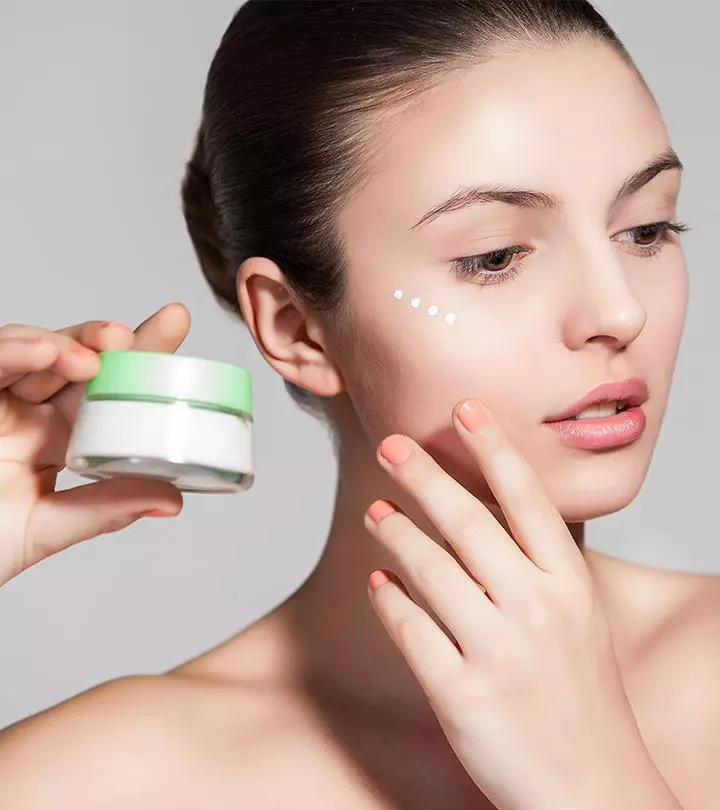

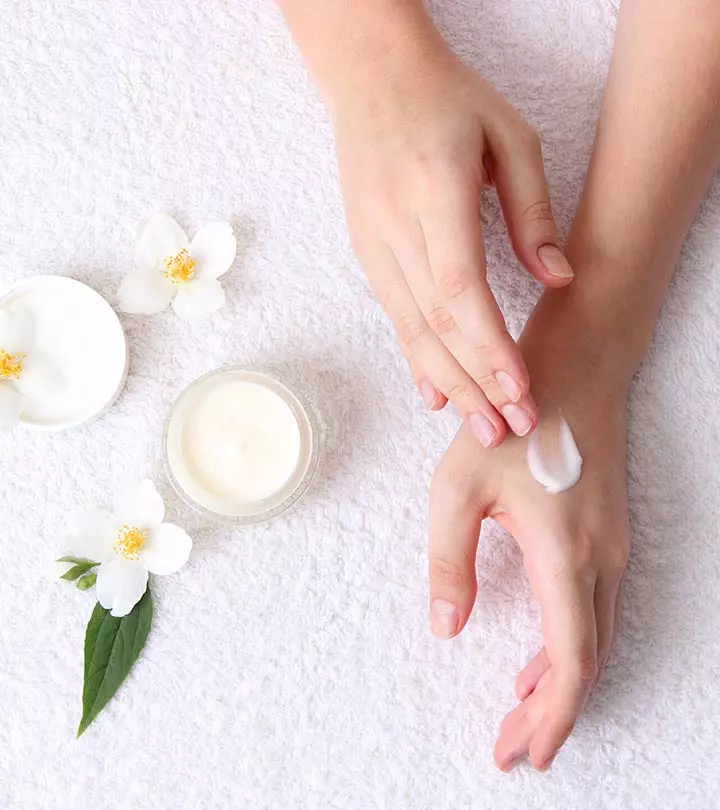
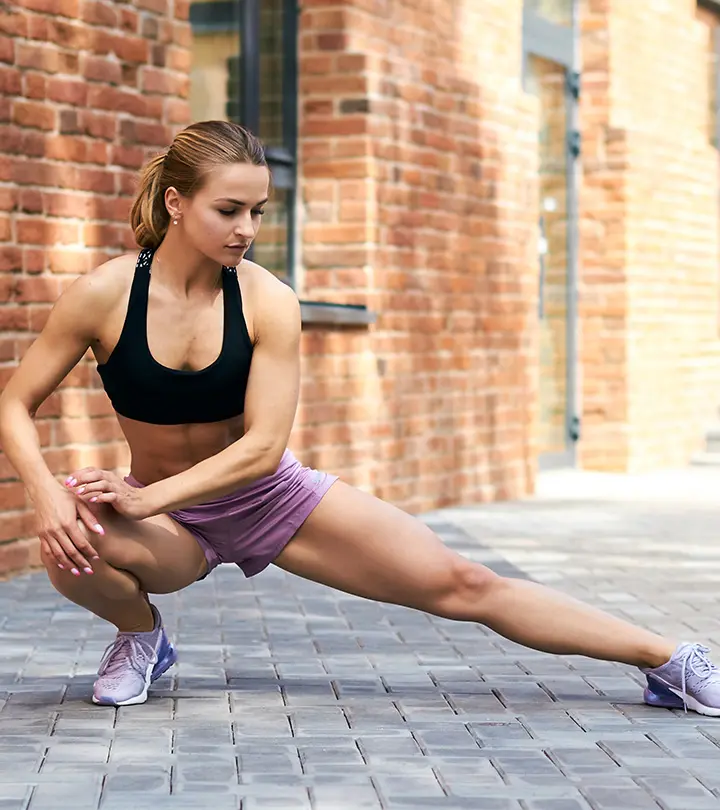
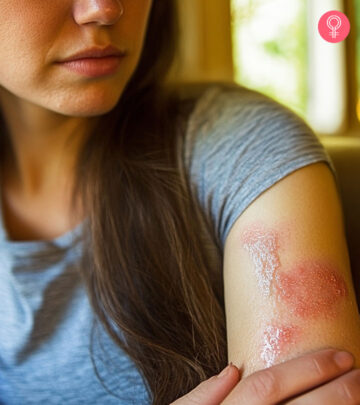



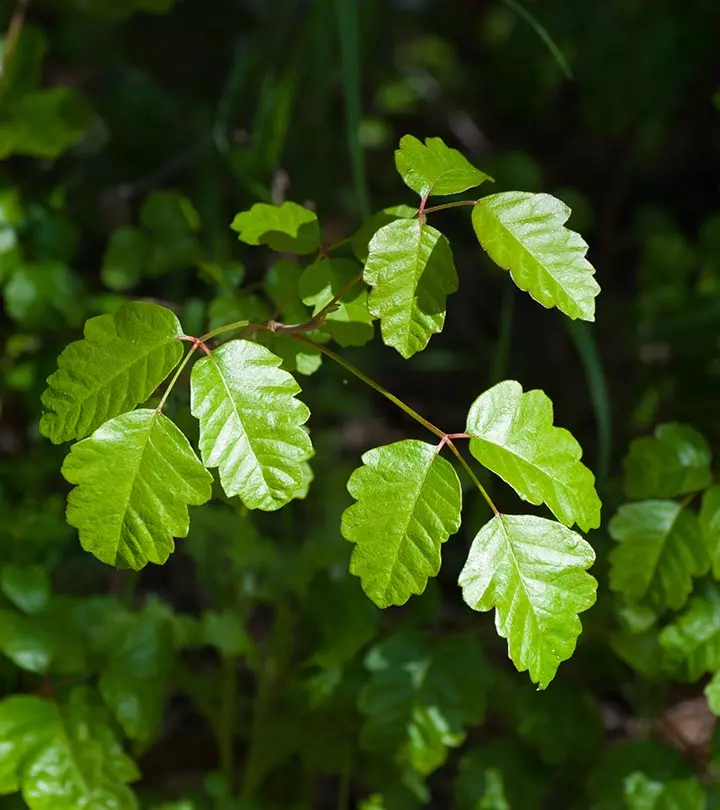

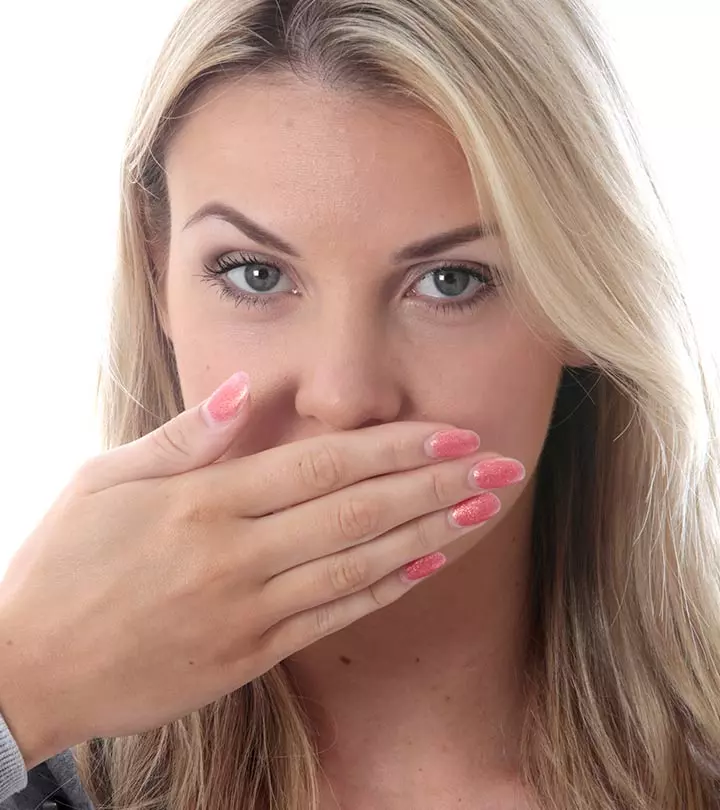

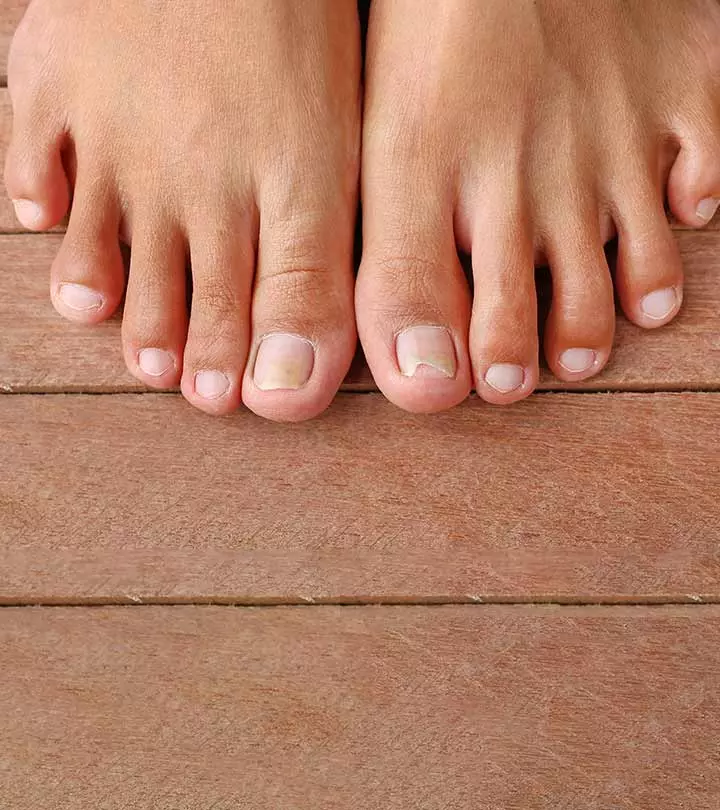


Community Experiences
Join the conversation and become a part of our empowering community! Share your stories, experiences, and insights to connect with other beauty, lifestyle, and health enthusiasts.